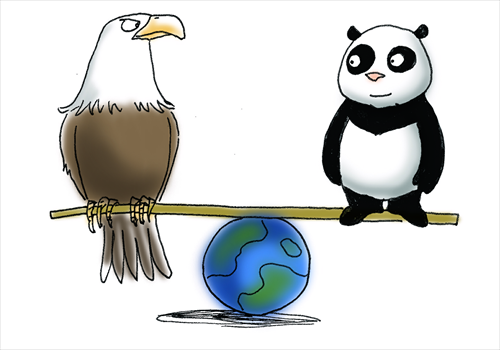HOME >> OP-ED
Mutual dependence will characterize new world order
By Ding Gang Source:Global Times Published: 2015-11-5 0:18:01

Illustration: Liu Rui/GT
Vice-Chairman of the Central Military Commission of China Fan Changlong met with Admiral Harry B. Harris Jr., head of the US Pacific Command, in Beijing on Tuesday. The two exchanged viewpoints on the South China Sea issue. Although the two sides still hold opposing stances, the atmosphere was much milder than the "tense" situation in the South China Sea.
A few days ago, the US Navy sent its guided-missile destroyer USS Lassen into waters within 12 nautical miles of Chinese islands in the South China Sea, and in response China sent its surveillance ships.
Such an incident can easily be interpreted as a "potential explosion point," but only when we consider the two scenes together can we grasp the nature of the current Sino-US ties.
In the past two years, I have interviewed CEOs of many Chinese enterprises in South America. In their stories, there has always been a US element.
When China increased the import of soy beans from Brazil, some US scholars blamed the Chinese demand fuelled forest loss along the Amazon River. When the government of Panama purchased security facilities from a Chinese company, some US observers said it would only make Panama more insecure.
No matter where Chinese enterprises go, such US elements can be felt. Americans have been constantly sending warnings about the presence of Chinese. But at the same time, the cooperation between China and the US is deepening, from which both have gained enormous benefits.
Not long ago, I attended a symposium on China-US relations in Atlanta. The speeches seemed to indicate two opposing scenes. While one scholar warned that the two sides should put the tensions over the South China Sea under control, another envisioned a blueprint in which China and the US can jointly develop Chongming Island in Shanghai into a world-class green spot.
The former scene can be taken as the spiraling escalation of tensions, while the latter is the one of cooperation. It may seem abrupt to shift from the South China Sea to Chongming, but it truly presents the dual character of Sino-US relations in this region.
This dual character is determined by the different status of China and the US in the international landscape, and will exist in the bilateral relations for a long time.
If China is to build a new system to balance the US role and influence, it will find the system can hardly succeed without US participation or cooperation. China cannot escape the constraint of "US standards."
Therefore, the idea that China will replace the US and build a China-led system to counterbalance the US one is totally a false proposition.
Similarly, if the US tries to counter China' rise with a system that it built with its allies after WWII and consolidated in the old Cold War, the system will not function properly because the political and economic environment of the whole region has changed.
Since China's rise, the world has somewhat indulged in the illusion that China can replace the US to provide the most economic momentum and public goods to the globe.
Part of the reason is the lack of knowledge about the complexity of China's rise, and some are deliberately making up stories about US decline and China's rise.
The Sino-US relations are not as simply as the two just competing with each other. No matter how powerful each of them is, they are unlikely to architect two opposing poles where they can survive without the other, as happened in the Cold War era. Disputes will continue to accompany the bilateral relations, but they have no choice but cooperation.
The author is a senior editor with People's Daily. He is now stationed in Brazil. dinggang@globaltimes.com.cn. Follow him on Twitter @dinggangchina
Posted in: Viewpoint, Ding Gang